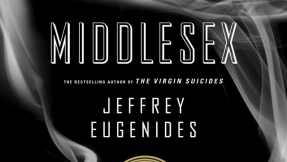Middlesex and the Pursuit of Identity

Following the success of his debut novel, Jeffrey Eugenides wrote Middlesex, a story centered on Calliope Stephanides, chronicling the lives of the three generations of the Stephanides family.

Middlesex follows the story of Calliope Stephanides. At the start of the novel, Cal chronicles his grandparents’, Eleutherios (“Lefty”) and Desdemona, life in Smyrna, Greece. Lefty and Desdemona are, in fact, siblings, orphaned by the ongoing wars. Fleeing from the burning city and journeying to America towards a better life, Lefty and Desdemona marry aboard the ship guided to America. Now living in Detroit, Lefty and Desdemona experience life during the Prohibition era. Together, they start a family, raising their children Milton and Zoe. When Milton comes of age, he falls in love and marries Tessie Zizmo, his second cousin. Tessie gives birth to her first child, a boy known throughout the whole novel as Chapter Eleven. Their second child is our delightful narrator, Calliope “Callie” Stephanides. Unbeknownst to the Stephanides family, Callie is an intersex, or, more specifically, a hermaphrodite. From there, Cal embarks on a journey of self-discovery, gradually finding acceptance of himself.
Winner of the 2003 Pulitzer Prize, Eugenides’ international best-seller intertwines historical events such as Watergate, the Turkish invasion of Cyprus, and the Great Fire of Smyrna. For Lefty and Desdemona, fleeing their native homeland and immigrating to America symbolizes rebirth. Escaping Smyrna allows them to put the past behind them and start anew in America; however, they often find themselves caught between two cultures.
The title “Middlesex” bears significance to the novel. By “middle,” word dictates “a point or position at an equal distance from the sides, edges, or ends of something.” At cursory glance, the title refers to Cal. Cal was born with both male and female genitalia. As the story progresses, readers discover “Middlesex” is the name of the street that Cal was growing up in during his adolescent years. According to an interview on with Jeffery Eugenides, he stated the title implied “the androgynous nature” of the protagonist (“Q & A with Jeffery Eugenides”). Not only that, but the title also refers to events or characters that remain at the center of the spectrum. For example, “The Minotaur,” the play Lefty and Desdemona attend focuses on a mythical creature that is part man and part bull. The story deals not only with Cal as a hybrid of two genders, but also with a hybrid of two different cultures: Greek and American. Several of the character from Middlesex undergo an identity crisis.
The grandparents of Cal, for example, Lefty and Desdemona Stephanides travel to America and become expose to a culture different from their own. Both Milton and Tessie are the children of immigrants, caught between two different cultures. Throughout the story, we don’t see Tessie finding difficulty with her identity, unlike Milton. At birth, he was given the name, Miltiades, named “after the great Athenian general” (125). Later in the child’s life, he would be known as “Milton,” after the English poet, John Milton. In Tessie’s case, she was born “Theodora Zizmo,” but as she gets older, she’s known as “Tessie.” Already, readers begin to see the second generation immigrants starting to assimilating into their culture.
As Middlesex is partially an immigration novel, the setting often reflects the characters’ identity. In Lefty and Desdemona’s case, they lived in Detroit, where Henry Ford his automobile company, thus representing their humble beginnings and pursuit of the American dream. A few years later, Milton moves his family from Detroit to Grosse Point. Finding many “For Sale’ signs throughout the area, Milton and his family discover many properties “suddenly went off the market, or were sold, or doubled in price” (254). While Milton views of the houses, his real estate agents asks questions regarding his profession, slowly realizing that she’s not selling the property to “the right sort of people” (256). The narrator explains that the real estate agent uses the Point System to evaluate prospective buyers, but in this case, the Point System is used as a racial or cultural identification to abide by “community standards” (256). Since Milton successfully purchases the Grosse Pointe property, taking a step away from his middle class status and rising to the upper class.
With a new house brings along big changes for Cal: puberty. While the first two sections of the novel consisted of questions of cultural identity, Cal’s story focuses on gender identity. Eugenides raises an interesting argument regarding gender identity. At the start of the novel, Cal narrates the events prior to his birth: his grandmother, Desdemona dangles a silver spoon over his mother’s Tessie’s stomach. Based on the movement of the spoon determines whether the unborn child will be a girl or a boy. Unbeknownst to Desdemona, gender and sex are two different things: sex is biological and gender and is cultural.

Although raised female (and known as Calliope Helen Stephanides until his late teens), Cal is genetically male. In many ways, Cal’s family adhere to gender stereotypes. As Cal states, Tessie “starved for a daughter,” going “overboard in dressing me” (224). Cal was raised as a girl, and “had no doubts about this,” until he reached puberty (226). Because of puberty, Cal becomes aware of his body’s physical changes (specifically while playing sports) and leading him to avoid taking showers after gym class in front of everyone. Around this time, Cal meets and falls in love with a girl known only as the Obscure Object.
While the narrator argues that attending an all-girls school might light to developing crushes on females, it was totally acceptable; however, Cal argues that what he felt for the Obscure Object “felt physical” (328). A tradition from the school, Baker & Inglis, will be performing the Greek play, Antigone, allowing the Obscure Object and Cal to become friends. Casted as Antigone is the Obscure Object, while the narrator will be playing Tiresias. The play shares significant relevance to the narrative. Antigone follows the titular heroine, who is a product of incest, following one of the themes of the story. Tiresias is a blind profit, but also famous for being transformed into a woman. Eugenides continuously relies on the literary devices to reflect his central themes. It is on the day of the play that Cal realizes his true feelings for the Obscure Object, feeling “a wave of pure happiness surge through [his] body. Every nerve, every corpuscle, lit up. I had the Obscure Object in my arms” (339).
I was born twice: first, as a baby girl, on a remarkably smogless Detroit day in January of 1960; and then again, as a teenage boy, in an emergency room near Petoskey, Michigan, in August of 1974.
The quote above signifies a rebirth for Cal, another prominent theme shown throughout the novel. Towards the end of the novel, Cal realizes that he was born with 5-Alpha-Reductase Pseudohermaphrodites, genetically male but born with external genitalia appearing female, causing our narrator to question his identity by fleeing to San Francisco. The unexpected death of his father brings Cal home and his story comes full circle. Cal explains that there is an old Greek custom where a man guards the door, blocking the doorway to keep away spirits from reentering the house until the church service was over. Cal does not attend his father’s service, but instead guards the doorway (529). The story has come full circle, beginning at first birth as a girl, and ends with his acceptance of identifying himself as a man.
Works Cited
Eugenides, Jeffrey. Middlesex. New York: Picador, 2002. Print.
“Q & A with Jeffrey Eugenides.” Oprah.com. Oprah Winfrey. Web.
What do you think? Leave a comment.











The most beautiful book I’ve ever read. Left me in tears in some parts, laughing at others.
I loved Desdemona and Lefty, and found much of the story interesting, but the actual story of Callie to Cal, meh. It was funny though, at one point, like 50 pages left, I’m thinking, What happened to Desdemona? Did I miss her death? And within 10 pages, there she is. Phew.
The most disappointing thing about the book is it ends up reinforcing stereotyped, dumb ideas about gender (like “Breasts have the same effect on me as on anyone with my testosterone level” — as if there were no gays). Callie’s pursuit of The Object doesn’t make her question categories, it just convinces her she’s a boy. There is no middle sex here; there’s no middle ground; it’s more gawking than Tiresias-like insight.
I found the book to be engrossing, charming and fascinating.
I started reading this book with high hopes because of all the great reviews I had read and heard. Not sure why the rave reviews. I definitely found the book interesting but at the same time disturbing and hard to read at times. The whole incest thing didn’t do it for me and it wasn’t until the end of the book when the book touched on the scientific explanation of the childs condition did I find it interesting to read.
I just don’t get it. I think the problem was where I was coming from. My sister, always an excellent source of reading advice, told me it was about gender identity….and it was…after almost 300 pages having been used up on the life of immigrant, incestuous Greeks.
Thanks for the good article. This was an interesting premise for a book.
I think it must be very hard to end a book well. I say that because so many times I enjoy a book, but want to change the ending. Or I’m sort of “meh” on a book, and the ending makes me like it or hate it. or I notice that it just peters out. That said, I really liked the ending of this one. Really. I loved how it circled back to the tradition we read about way near the beginning,
This was an odd book. I just keep saying that, over and over. This is a really odd book.
This had interesting cultural references and a good story. Been a while since I read it though.
amazing family epic.
I feel like the author skipped the hardest part to portray – most of the main character’s actual transition of apparent gender. He just sort of goes through one short rough patch and is then accepted unilaterally? Wishful thinking, especially given the time period.
Exactly. I felt that the most important subject was merely grazed over – or maybe, did I misunderstand what the most important subject was? Maybe while I was so focused on the transition I should have been focusing on something else? Still, I feel like the transition should have had more detail, more struggle, more emotion.
Beautifully written as it gives the book an authentic tone.
It wasn’t until I had finished that I realized it wasn’t autobiographical!
I’m in the process of reading this book right now for the first time, and your article seems such a wonderful way of capturing the essence of this work. I’m caught up in the midst of this story lately, and I can’t get enough of Eugenides’ work. Thanks for sharing!
I enjoy reading things about identity struggles because identity is a social construct, but it is also defined through negative values. For example, I am me because I am not a table, or a dog, or a cloud. I am female because I am not male. The cultural struggle and the gender identity struggle, that middle tension of being both, is an interesting place to be and read about because it is only culture that mandates that we need to be one or the other. The way we categorize self-hood as a culture depends on it or else we have to go through a paradigm shift.
This provides an excellent detailed summary of a major work of recent American fiction. I’d love to hear more thoughts on how identity–cultural and gender–is created. What does Eugenides suggest about that?
This is one of the best books I have read in a while. I love the style of writing. The main idea I took away from this book is that identity is just as much based on where you have come from as it is where you are going. Just because someone expects you to be something doesn’t mean that is who you are. That seems like an obvious sentiment on the surface, but it applies even to things like gender or who it is okay to love. Eugenides takes very controversial topics like gender transition and incest and weaves them into touchingly vibrant stories that resonate at least at some level with almost everyone. Some people find the topics odd, which is fine. However, if that applies to you I would hope that you dig deep within yourself and try to figure out exactly what about these stories makes you uncomfortable. Don’t just rely on social norms or what you have been told, really ask yourself what these stories mean to you.
I have not heard of this book until now. Thanks for your article and for the further enticement to read the book! I can’t wait to get it!
What I would wonder about is the role of the parents in relation to Cal.